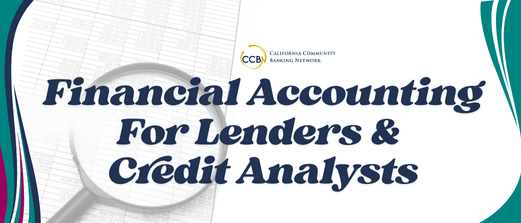Financial Accounting for Lenders & Credit Analysts
Join Us Virtually
A banker’s understanding of accounting fundamentals is essential to the application of sound financial statement and credit analysis. Accounting is the language employed to communicate financial information. It is the process of identifying and measuring economic events, then classifying, recording, and summarizing the measurements and reporting the information to permit judgments and decisions by the users. Bankers rely on this accountant prepared information to make such decisions.
Financial Accounting for Lenders presents the fundamentals of accounting, with a focus on the accounts that will be of most interest to a banker, identifying economic events and how they are reported in financial statements. By learning how the Balance Sheet, Income Statement, Reconciliation of Net Worth and Cash Flow Statement are developed and connected to each other learners gain insights that will be critical in further developing their credit analysis skills. And having an instructor who is a banker ensures the approach will be from a banker’s perspective. Case studies will be used to reinforce concepts presented. Specifically, the course will cover:
- Underlying Assumptions Used by Accountants
- Rules of Debits and Credits
- Construction of the Balance Sheet, Income Statement, Reconciliation of Net Worth, and the Statement of Cash Flow
- Difference between Accrual and Cash Basis Accounting
- Analysis of Accounts often used as Collateral such as:
- Accounts Receivable (Aging Schedules, Allowance Calculations, etc.)
- Inventory (Effect of LIFO, FIFO, and Average Cost Costing Methods)
- Fixed Assets (Effect of varying Depreciation Methods)
- Analysis of the Notes to the Financial Statements
- Types of Financial Statements and meaning of CPA’ Opinions
- Review of Major Accounting Standards and Where to Find Them
OBJECTIVES
After completing this course, the participant be able to:
- Identify inaccurate and/or unreliable financial statements
- Describe the purpose of each financial statement and how they are constructed
- Define line items and give examples of underlying transactions
- Determine how specific business activities impact the financial statements and how they are connected
- Calculate earnings, equity, cash flow for a business
- Describe the accounting used for major collateral accounts
PRESENTER
Jeffery W. Johnson, Principle, Bankers Insight Group is a banking training professional who leads seminars on key industry issues across the U.S. He actively teaches for over 20 state and community banking associations, the Risk Management Association (RMA), and banks nationwide. Co-author of the RMA course “Lending to Service and Other Professional Organizations” (2001), he began his career at SunTrust Bank, advancing to senior roles at SouthTrust Bank and Citizens Trust Bank in Atlanta. His expertise spans Credit Administration, Lending, Business Development, Loan Review, and Training, with experience managing diverse loan portfolios and teams.
AUDIENCE
Commercial Lenders, Consumer Lenders, Branch Managers, Credit Analysts, Loan Review Officers, Credit Officers and Directors requiring a better understanding of financial statements.
Registration Options
|
Registration Options
|
Price |
|---|---|
|
Member Regular Registration
Registration Ended 1/28/25 at 11:59 PM PST
|
$695.00 See QTY Discounts |
|
Non-Member Regular Registration
Registration Ended 2/4/25 at 11:59 PM PST
|
$995.00 See QTY Discounts |
|
Member Late Registration
Registration Ended 1/31/25 at 11:59 PM PST
|
$895.00 |
|
Non-Member Late Registration
Registration Ended 2/4/25 at 11:59 PM PST
|
$1,195.00 |
|
Community Bankers of Washington (CBW) Mem Regular
Registration Ended 1/30/25 at 11:59 PM PST
|
$695.00 See QTY Discounts |
|
Community Bankers of Washington (CBW) Mem Late
Registration Ended 2/4/25 at 11:59 PM PST
|
$895.00 See QTY Discounts |
12 CPE Credits
Program Level: Beginner
Prerequisites: None
Delivery Method: Group-Internet based
Field of Study: Finance; Specialized Knowledge
Cancellation and Complaint Resolution Policy
Substitutions are allowed, at no additional cost. Written notice is required for all cancellations. The full registration fee will be refunded if the written request is received up to 4 weeks before the event and 50 percent if received 2 weeks before the event. No refunds will be granted within two weeks of the event. For more information regarding refund, complaint, and/or program cancellation policies contact our offices at 800-627-6613.
California Community Banking Network is registered with the National Association of State Boards of Accountancy (NASBA) as a sponsor of continuing professional education on the National Registry of CPE Sponsors. State boards of accountancy have final authority on the acceptance of individual courses for CPE credit. Complaints regarding registered sponsors may be submitted to the National Registry of CPE Sponsors through its website:www.nasbaregistry.org.


